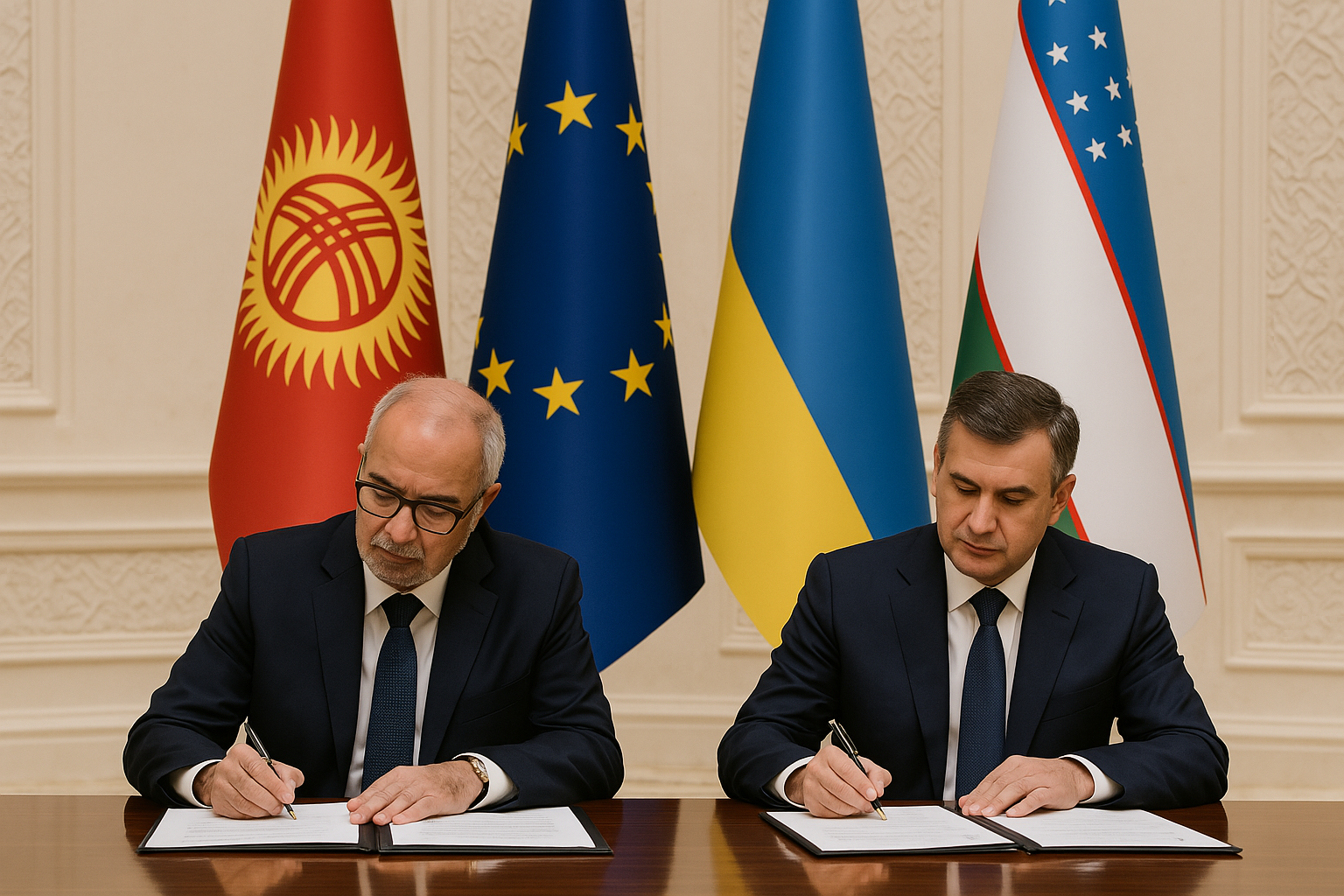EIB Signs Major Investment Deals at EU-Central Asia Summit, Paving Way for Growth
The agreements will unlock a combined €365 million, which has the potential to mobilize up to €1 billion in investment across crucial sectors such as sustainable transport, water management, and climate resilience.

At the inaugural EU-Central Asia Summit held in Samarkand, Uzbekistan, European Investment Bank (EIB) Vice-President Kyriacos Kakouris took center stage by signing four pivotal memorandums of understanding (MoUs) with key partners from Kyrgyzstan, Tajikistan, and Uzbekistan. These MoUs mark a significant milestone in the European Union’s commitment to fostering sustainable development, environmental protection, and infrastructural growth across Central Asia.
The agreements will unlock a combined €365 million, which has the potential to mobilize up to €1 billion in investment across crucial sectors such as sustainable transport, water management, and climate resilience. The project's aim is to improve the region's infrastructure while supporting long-term economic and environmental goals.
These deals are aligned with the EU’s Global Gateway strategy, a forward-thinking initiative designed to boost private sector development, enhance sustainable transport and logistics, improve water management, and contribute to environmental sustainability throughout Central Asia. The strategy seeks to foster closer economic ties between Europe and Central Asia, positioning the EU as a key partner in the region’s economic and social transformation.
A Closer Look at the Agreements
The four memoranda of understanding represent a robust partnership between the European Union and Central Asia, covering significant investments in key infrastructure and sustainable projects. Each MoU outlines specific agreements between the EIB and local partners:
-
Kyrgyzstan State Development Bank – A €50 million agreement will help strengthen key infrastructure investments through the National Promotional Bank, enabling Kyrgyzstan to develop vital infrastructure that supports sustainable growth.
-
Government of Tajikistan – Tajikistan will receive €100 million to support the development of sustainable transport infrastructure along the Trans-Caspian Transport Corridor. This project aims to enhance regional connectivity and bolster the country's strategic position in Central Asia’s growing transportation network.
-
Uzbekistan Water Implementation Centre – A significant €175 million agreement will focus on water management and environmental sustainability, especially as part of the ongoing Aral Sea Project. This initiative, carried out in collaboration with the French Development Agency (AFD), aims to address the devastating ecological impact of the Aral Sea crisis and support regional efforts in water conservation.
-
JSCB Microcreditbank, Uzbekistan – €40 million will be allocated to help support private sector development, enabling local financial institutions to finance projects that enhance sustainable transport and logistics connectivity, thus stimulating the economy.
These agreements underscore the EU’s broader vision for enhancing regional cooperation and addressing critical environmental challenges. They also highlight the European Investment Bank’s role as a leader in sustainable finance and infrastructure development across the region.
New Milestones for the EU-Central Asia Partnership
A notable development at the summit was the signing of a Host Country Agreement between the EIB and Uzbekistan, represented by Minister of Investment, Industry, and Trade Laziz Kudratov. This agreement is a crucial step in increasing the EIB’s footprint in Central Asia, allowing the bank to set up its Regional Representation in Uzbekistan. This expanded presence will facilitate smoother operations and enable the EIB to play a more active role in driving economic and infrastructural projects across the region.
Additionally, the EIB announced the opening of negotiations for a framework agreement with Turkmenistan, another key Central Asian country. Once finalized, this agreement will lay the legal groundwork for the EIB to begin operations in Turkmenistan, marking another significant step in strengthening the EU’s ties with Central Asia.
EIB’s Vision for Central Asia
Kyriacos Kakouris, EIB Vice-President and overseer of the bank's operations in Central Asia, highlighted the strategic importance of these agreements during his remarks at the summit. Kakouris emphasized the EU and Central Asia’s shared commitment to deepening mutually beneficial cooperation, especially in key sectors like transport, water management, and climate resilience.
“The successful implementation of these memorandums of understanding will not only help improve infrastructure but will also boost regional cooperation and sustainable development in Central Asia,” said Kakouris. “As the Bank of the European Union, the EIB is committed to strengthening economic ties, promoting sustainability, and supporting private sector development across the region.”
The agreements will have far-reaching implications, providing financial support for sustainable development projects that aim to tackle pressing challenges such as water scarcity, environmental degradation, and inefficient infrastructure. By focusing on long-term solutions, these projects promise to have a lasting impact on the region’s prosperity and sustainability.
Strengthening EU-Central Asia Cooperation
The agreements signed at the EU-Central Asia Summit reflect the deepening ties between the European Union and Central Asia, as both regions look to build a more interconnected and sustainable future. The €365 million investment is just the beginning of a new chapter in the EU’s engagement with the region, with many more projects and opportunities on the horizon.
With the EU’s Global Gateway strategy driving private sector growth and infrastructure development, and the EIB’s leadership in financing sustainable initiatives, Central Asia stands to benefit from a wide range of investments that will improve livelihoods, enhance regional cooperation, and support long-term sustainability.
As the region continues to grow and modernize, the partnerships formed through the EIB’s memorandums of understanding will play a key role in helping Central Asia navigate the challenges of the 21st century, all while working toward a greener, more resilient future. The EU’s investment in Central Asia represents a win-win scenario, benefiting both regions by fostering stronger economic ties, enhancing sustainability efforts, and boosting regional integration.










